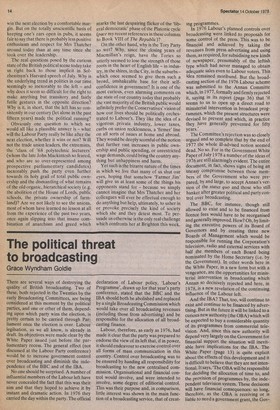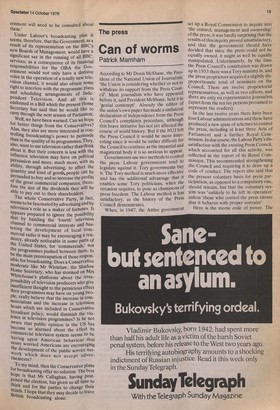The political threat to broadcasting
Grace Wyndham Goldie
There are several ways of destroying the quality of British broadcasting. Two of these, both rejected in the Twenties by the early Broadcasting Committees, are being considered at this moment by the political parties, and one or other of them, depending upon which party wins the election, is pretty certain to be carried through Parliament once the election is over. Labour legilsation, as we all know, is already in draft. Its objectives were made clear by the White Paper issued just before the parliamentary recess. The general effect (not discussed at the Labour Party conference) would be to increase government control over broadcasting and diminish the independence of the BBC and of the IBA.
No one should he surprised. A number of influential members of the Labour left have never concealed the fact that this was their aim and that they hoped to achieve it by instant and dramatic action. In 1976 they carried the day within the party. The official declaration of Labour policy, 'Labour's Programme', drawn up for that year's party conference, stated that the BBC and the IBA should both be abolished and replaced by a single Broadcasting Commission which would take over all broadcasting revenues (including those from advertising) and be responsible for the allocation of all broadcasting finance.
Labour, therefore, as early as 1976, had made it clear that the party was prepared to endorse the view of its left that, if in power, it should endeavour to exercise control over all forms of mass communication in this country. Control over broadcasting was to be ensured by handing all responsibility for broadcasting to the new centralised commission. Organisational and financial control would involve, and were intended to involve, some degree of editiorial control. This was their purpose and, in comparison, little interest was shown in the main function of a broadcasting service, that of creat ernment will need to be consulted about them.'
Under Labour's broadcasting plan it seems, therefore, that the Government, as a result of its representation on the BBC's new Boards of Management, would have a Significant say in the running of all BBC. services; as a consequence of its financial responsibilities for the OBA the Government would not only have a decisive voice in the operation of a totally new television channel, it would also obtain some right to interfere with the programme plans and scheduling arrangements of Independent Television. And all this is enshrined in a Bill which the present Home Secretary has said that he would like to carry through the next session of Parliament. Well, we have been warned. Can we hope for better things from the Conservatives? Alas, they also are more interested in controlling broadcasting's power to persuade than in the quality of its programmes. They, also, want to use television rather than think about it. But their concern is less with the influence television may have on political persuasion and more, much more, with its ability, through advertising, to affect the quantity and kind of goods, people can be persuaded to buy and so increase the profits of the great commercial companies, therefore the size of the dividends they will be able to pay out to their shareholders. The whole Conservative Party, in fact, seems to be fascinated by advertising and by television's role as a maker of fortunes. It appears prepared to ignore the possibility that by handing the 'fourth' television channel to commercial interests and hastening the development of local commercial radio it may be encouraging a tendency, already noticeable in some parts of the United States, for 'commercials,' not the programmes pushed between them, to be the main preoccupation of those responsible for broadcasting. Does a Conservative moderate like Mr Whitelaw, the Shadow Home Secretary, who has stormed on Mrs Whitehouse's platforms about the irresPonsibility of television producers who give insufficient thought to the pernicious effect their programmes may have on young People, really believe that the increase in commercialism and the increase in television hours which are included in Conservative broadcast policy, would diminish the violence in television programmes? Is he not aware that public opinion in the us has become so alarmed about the effect its commercial television system seems to be having upon American behaviour that many worried Americans are encouraging the development of the public service network which does not accept adver tisements?
To my mind, then the Conservative plans for broadcasting offer no solution. The best hope is that Mr Callaghan, having postPoned the election, has given us all time to think and for the parties to change their minds. I hope that they may decide to leave British broadcasting alone.



































 Previous page
Previous page